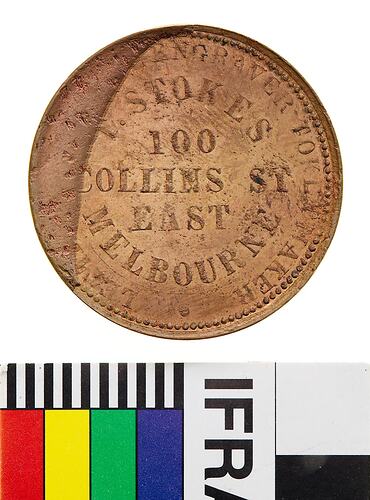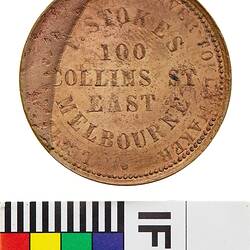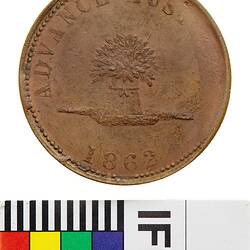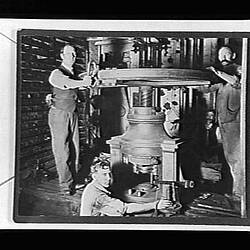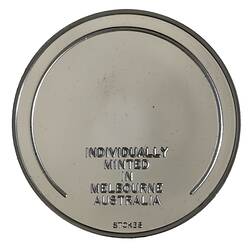Summary
Copper one Penny token, minted by Thomas Stokes of Melbourne, circa 1918. Originally issued by Thomas Stokes, Diesinker, Token Maker & Medallist, Melbourne, in 1862. This token is a late-strike of one of the large number of anonymous tokens struck by Stokes late in 1862. Anonymous issues were manufactured employing two stock dies. Thomas Stokes migrated to Australia in search of gold in the 1850s, being unsuccessful he returned to his trade as a die-maker and button maker. In 1857 Stokes acquired a press from W.J. Taylor and began to mint large numbers of tradesmen's tokens. He also commenced the Australian Medallic Issues. In 1873 Stokes took a partner, Martin, and the business was re-named Stokes & Martin. In 1893 a disastrous fire damaged a large portion of the business, Martin had forgotten to renew the fire insurance policy, and the partnership was dissolved as a result. Stokes rebuilt the business as Stokes & Son. The business became a proprietary concern in 1911, re-named Stokes & Son Pty Ltd. In 1935 the business moved to Brunswick, and in 1962 Stokes became a public company, renamed Stokes (Australasia) Pty Ltd. Today the business is located in Ringwood.
Previous collections: National Gallery of Victoria
Physical Description
A round copper token (34 mm diameter) featuring the name address and buisness of Stokes: T. STOKES 100 COLLINS ST. EAST MELBOURNE LETTER CUTTER SEAL ENGRAVER TOKEN MAKER. The reverse features At centre a wheat sheaf tied with a cord 4.7 mm long, above, ADVANCE AUSTRALIA; below, 1862 border of 114 beads. (Stock reverse Andrews type 21 = Heyde Sheaf 1 = Sharples Sheaf 1). The obverse die had a large chip in an arc from the rim at 07 to 12 and the reverse did not strike up where the chip existed.
Obverse Description
At centre within a line circle in five lines, T. STOKES / 100 / COLLINS ST. / EAST / MELBOURNE around, [LETTER CUTTER SEAL] ENGRAVER TOKEN MAKER : The obverse die had a large chip in an arc from the rim at 07 to 12 removing the lettering shown here within square brackets and the reverse did not strike up where the chip existed.
Reverse Description
At centre a wheat sheaf tied with a cord 4.7 mm long, above, ADVANCE AUSTRALIA; below, 1862 border of 114 beads. (Stock reverse Andrews type 21 = Heyde Sheaf 1 = Sharples Sheaf 1)
Edge Description
Plain
More Information
-
Collecting Areas
-
Acquisition Information
Transfer from National Gallery of Victoria (NGV), 15 Mar 1976
-
Date Issued
circa 1918 AD
-
Issued By
Thomas Stokes, Melbourne, Greater Melbourne, Victoria, Australia
-
Mint
-
Previous Collection
Numismatics Collection, National Gallery of Victoria (NGV), pre 1976
-
Inscriptions
Obverse: T. STOKES 100 COLLINS ST. EAST MELBOURNE LETTER CUTTER SEAL ENGRAVER TOKEN MAKER Reverse: ADVANCE AUSTRALIA 1862
-
Denomination
-
Series
-
Material
Copper
-
Axis
12
-
Classification
-
Category
-
Discipline
-
Type of item
-
Dimensions
34 mm (Outside Diameter), 15.192 g (Weight)
-
Shape
Round
-
References
[Book] Andrews, Arthur. 1921. Australasian Tokens and Coins., No. 529
[Book] Heyde, Gilbert C. & Skinner, Dion H. 1967. Unofficial Coins of Colonial Australia and New Zealand., No. 234/18
[Article] Sharples, John P. 1993. A Catalogue of the Trade Tokens of Victoria 1848 to 1862. Journal of the Numismatic Association of Australia. vol.7: p.1-77.
-
Keywords
